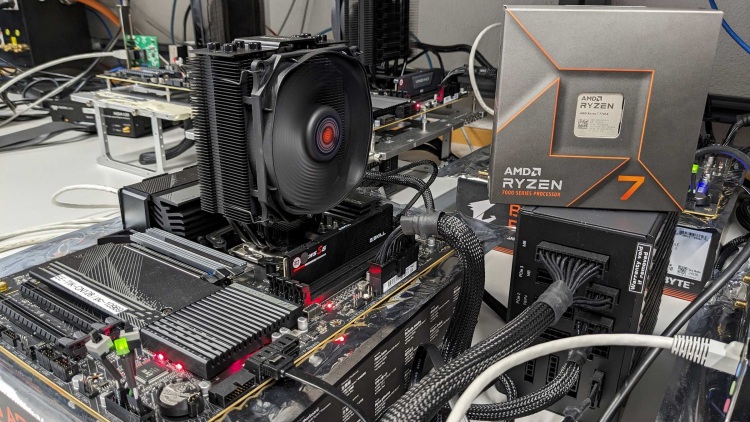[ad_1]

Researchers from ETH Zürich have not too long ago found vulnerabilities in AMD’s Zen 3 and Zen 4 structure. These vulnerabilities have an effect on AMD CPUs throughout numerous platforms, together with laptops, desktops, and knowledge facilities. AMD has shortly acknowledged the existence of those vulnerabilities and has expressed their dedication to mitigating the dangers related to them. On this article, we’ll discover the ‘Inception’ vulnerability affecting AMD processors and talk about whether or not customers needs to be involved about potential knowledge leaks.
AMD Inception Vulnerability Defined
The Inception vulnerability is categorized as a side-channel assault. Researchers have noticed that the mitigations put in place by AMD to stop attackers from altering the state of microarchitectural buffers should not totally efficient. Regardless of the existence of {hardware} and software program mitigations, which usually take away dangerous knowledge from an data container like a file (generally known as knowledge sanitization), these vulnerabilities proceed to persist. This assault is just like the ‘Spectre’ vulnerabilities that have been beforehand present in Intel CPUs.
Daniël Trujillo, a safety researcher specializing in microarchitectures, described the Inception assault as follows: “It regarded as if we may make the CPUs manufactured by AMD imagine that that they had seen sure directions earlier than, whereas in actuality that had by no means occurred.”
AMD’s report means that newly downloaded malware may exploit these vulnerabilities to achieve unauthorized entry to delicate and confidential knowledge on a consumer’s laptop. As a precautionary measure, customers with Zen 3 and Zen 4 CPUs are suggested to promptly replace their methods and hold their malware-detection instruments energetic.
Fortuitously, no exploits using the ‘Inception’ vulnerabilities have been reported within the public area, aside from the analysis surroundings. Nonetheless, AMD has initiated a mitigation course of to handle these vulnerabilities comprehensively. Zen 3 and Zen 4 CPU customers shall be protected so long as they make sure that their methods are patched with AMD’s upcoming AGESA Firmware replace for the BIOS or the µcode patch. Further particulars in regards to the Inception assault might be discovered within the supplied report [PDF].

Examine If Your AMD CPU is Affected by Inception Assault
Within the aforementioned report, AMD states that Zen 3 and Zen 4-based processors would require a µcode patch or an AGESA firmware replace for the BIOS to mitigate the vulnerabilities focused by the Inception assault.
To find out whether or not your AMD Ryzen CPU is affected by the Inception vulnerability, seek advice from the next lists that cowl each desktop and laptop computer processor lineups falling beneath the Zen 3 and Zen 4 architectures on your comfort:
Within the desktop CPU lineup (together with Workstation):
- third & 4th Gen AMD EPYC CPUs
- Ryzen 5000 & 4000 Sequence Desktop Processors (together with CPUs like Ryzen 5 5600G or Ryzen 7 4700G APUs)
- Ryzen 7000 Sequence Desktop Processors
- Ryzen Threadripper PRO 5000WX Sequence Processors
Within the laptop computer (cell) CPU lineup:
- Ryzen 5000 Sequence Cell Processors
- Ryzen 6000 Sequence Processors (with Radeon Graphics)
- Ryzen 7035 Sequence Processors (with Radeon Graphics)
- Ryzen 7030 Sequence Processors (with Radeon Graphics)
- Ryzen 7040 Sequence Processors (with Radeon Graphics)
- Ryzen 7045 Sequence Processors
What Steps Ought to You Take?
Contemplating the potential impression of the Inception assault on knowledge confidentiality, it’s essential for all customers to improve their BIOS or apply the standalone vulnerability patch as really helpful by AMD. If wanted, you possibly can seek advice from our BIOS replace information, which can help you in accessing the help web page of your motherboard producer to acquire the standalone patch. As soon as it’s accessible, it’s suggested to replace your system to the August 2023 AGESA firmware. We’ll hold you knowledgeable in regards to the launch of the patch to handle this vulnerability.
Continuously Requested Questions (FAQs)
1. What’s the Inception vulnerability?
The Inception vulnerability is a side-channel assault that impacts AMD’s Zen 3 and Zen 4 structure. It permits attackers to govern the state of microarchitectural buffers, probably compromising the safety and confidentiality of delicate knowledge.
2. How did researchers uncover the Inception vulnerability?
Researchers from ETH Zürich recognized the Inception vulnerability throughout their investigations into AMD processors. They discovered that the mitigations carried out by AMD to stop most of these assaults weren’t totally efficient.
3. Are all AMD CPUs prone to the Inception vulnerability?
No, not all AMD CPUs are prone to the Inception vulnerability. Particularly, CPUs inside the Zen 3 and Zen 4 architectures are affected.
4. How can I test if my AMD CPU is affected by the Inception vulnerability?
To test in case your AMD CPU is affected by the Inception vulnerability, seek advice from the lists supplied by AMD that cowl the desktop and laptop computer processor lineups beneath the Zen 3 and Zen 4 architectures.
5. What steps ought to I take to guard my system from the Inception vulnerability?
To guard your system from the Inception vulnerability, it is strongly recommended to improve your BIOS or apply the standalone vulnerability patch supplied by AMD. Keep up to date with the discharge of the August 2023 AGESA firmware and set up it as quickly because it turns into accessible.
6. Has there been any reported exploitation of the Inception vulnerability?
As of now, no exploits using the Inception vulnerability have been reported within the public area, aside from the analysis surroundings. Nonetheless, AMD is taking proactive measures to handle these vulnerabilities by way of patches and updates.
7. The place can I discover extra details about the Inception vulnerability?
Yow will discover extra details about the Inception vulnerability within the report printed by AMD, which gives detailed insights into the vulnerabilities and mitigation methods.
Conclusion
The Inception vulnerability affecting AMD processors, particularly these inside the Zen 3 and Zen 4 architectures, is a severe concern for customers. Nonetheless, AMD has promptly acknowledged the vulnerabilities and is engaged on mitigating the dangers. It’s important for customers to remain knowledgeable and take the mandatory steps really helpful by AMD, resembling updating their methods with the most recent patches and firmware releases. By following these precautions, customers can defend their delicate knowledge and make sure the safety of their AMD CPUs.
[ad_2]
For extra data, please refer this link
